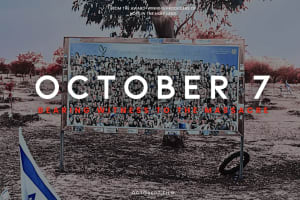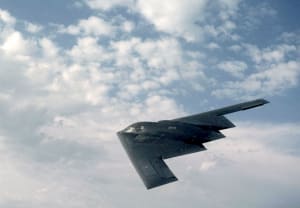Christmas in Israel: A celebration of faith and tradition in the Holy Land

“I don’t celebrate Christmas but I really like it,” an Israeli friend confided to me yesterday. Many Israelis love the lights, the decorations and the cozy atmosphere that Christmas celebrations exude, even if they’re not so keen on the central character: Jesus.
There are annual complaints of idolatry coming from those offended by Christmas trees and the like, but an increasing number of Israelis consider it a fun day out to visit the festivities in Christian areas.
Israel is frequently described as the only democracy in the Middle East, with freedom of speech and religion. This has been evident in the lively debates in the Knesset, which showcase the country's democratic processes. During Christmas, the freedom of religion is also clearly visible, with various religious groups celebrating openly.
There is a tiny minority of Christians, over three-quarters of whom are Arab. Israel’s Arab population, which makes up 21% of the country's total population, is largely Muslim. Just 7% of Israel’s two million Arabs are Christian, according to recent statistics.
As small as the Christian minority may be in Israel, Christmas still makes a big impact. Jews have lots of holidays – seven, nine, or even more, depending on how you count them, but Christianity has two main events: Christmas and Easter. So, Israeli Christians go all out when the big moment comes around.
During the month of December, lights and displays start appearing in notable Christian areas in Israel like Nazareth, Jaffa, parts of Haifa, Shfar'am, the village of Fassuta on the border with Lebanon, and the Christian quarter in Jerusalem.
In fact, two of the Old City’s four quarters in Jerusalem are decorated for Christmas, with the Armenian Quarter being the home of one of the oldest Christian communities in existence.
In Judea, Bethlehem also gets ready for the city’s big moment of fame, typically drawing thousands of pilgrims to visit for Christmas, with the annual lighting of the Christmas tree in front of the Church of the Nativity, where tradition marks the birth of Jesus.
There are Catholics, Eastern Orthodox, Evangelicals and Ethiopians, Armenians, Russians and Maronites, along with a host of other kinds of Christians in Israel.
Not everyone celebrates the incarnation on the same date, or in the same way, but diversity is the name of the game when it comes to celebrations in Israel. This is epitomized by Haifa’s “Holiday of Holidays” festival, which valiantly tries to straddle Christmas, Hanukkah, and whatever Muslim festival is nearest in their calendar that moves with the cycles of the moon.
On the weekends leading up to Christmas in the Wadi Nisnas area of northern Haifa, one will find traditional music and dancing, food and drinks, and stalls offering holiday items – with both Hanukkiahs and Santa hats in abundance.
A life-sized nativity scene also makes an appearance, with local believers singing worship songs about Jesus to the huge crowds visiting from across the country. Last year, the vibrant multicultural celebration marked its 30th anniversary, and this year promises to deliver plenty of fun and activities once again.
International tourists may be sparse in numbers this year due to the war, but a surprisingly large number of Israelis travel around the country to take part in Christmas events.
Nazareth, while a historically Christian city and the hometown of Jesus, is now predominantly an Arab town. It tends to "deck the halls" at Christmas, and many Israelis love it.
The Haaretz newspaper declared a few years ago, “Jewish Israelis have fallen in love with Christmas,” adding that “nowhere is this more evident than the northern Arab city where more than two millennia ago, according to Christian belief, a woman named Mary received news that she was bearing the Son of God.”
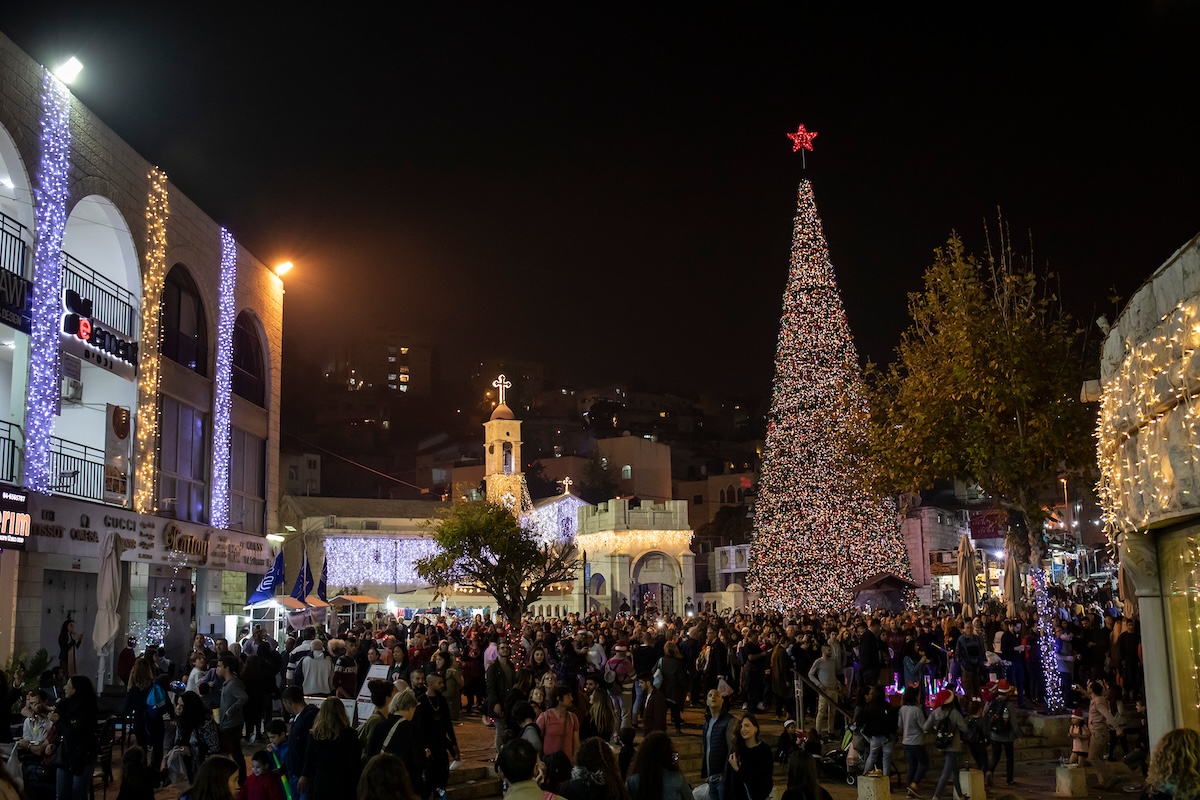
Whether due to curiosity or simply a love of the festive atmosphere, you’ll hear a lot of Hebrew in Nazareth and other Christian areas of Israel during Christmas. Many Israeli Jews have very little knowledge of the story of Jesus, so Hebrew-speaking tour guides can be seen leading groups around and explaining some of the meaning and history behind the celebrations.
Christ Church near Jerusalem’s Jaffa Gate also receives large numbers of Israeli visitors every Christmas, as they decorate the courtyard and offer traditional food and drink to all who come. The church holds special events and services, with explanations about the profound meaning of Christmas.
Other churches and Christian centers in Jerusalem like the YMCA also celebrate with decorations and holiday-related activities, creating a magical atmosphere. There are Christmas markets and concerts, carols and Christmas trees, with plenty to see and do. You might even see Jerusalem’s own Santa Claus riding around the old city on a camel!
The American Colony Hotel in East Jerusalem is a classic example of the fusion of cultures found in Israel, festooned as a beautiful Christmas wonderland with seasonal songs that occasionally get interrupted by the Muslim call to prayer.
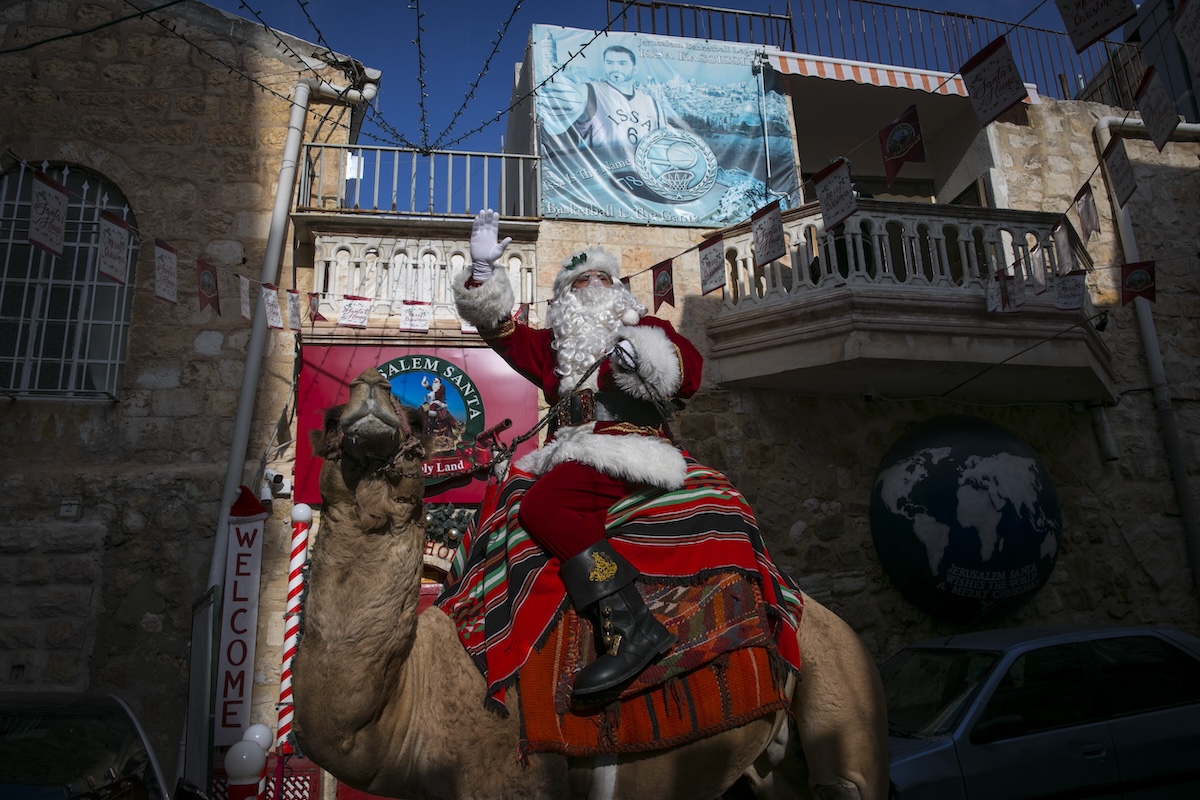
Christmas is usually a working day for most of Israel, and public celebrations can cause controversy when they take place close to ultra-Orthodox Jewish neighborhoods, but attitudes seem to be slowly changing.
Maoz Inon, who runs the Abraham Hostel in Nazareth together with the Arab family who owns the historic building, told Haaretz, “Israelis travel abroad more and more, so they’ve become exposed to Christmas.”
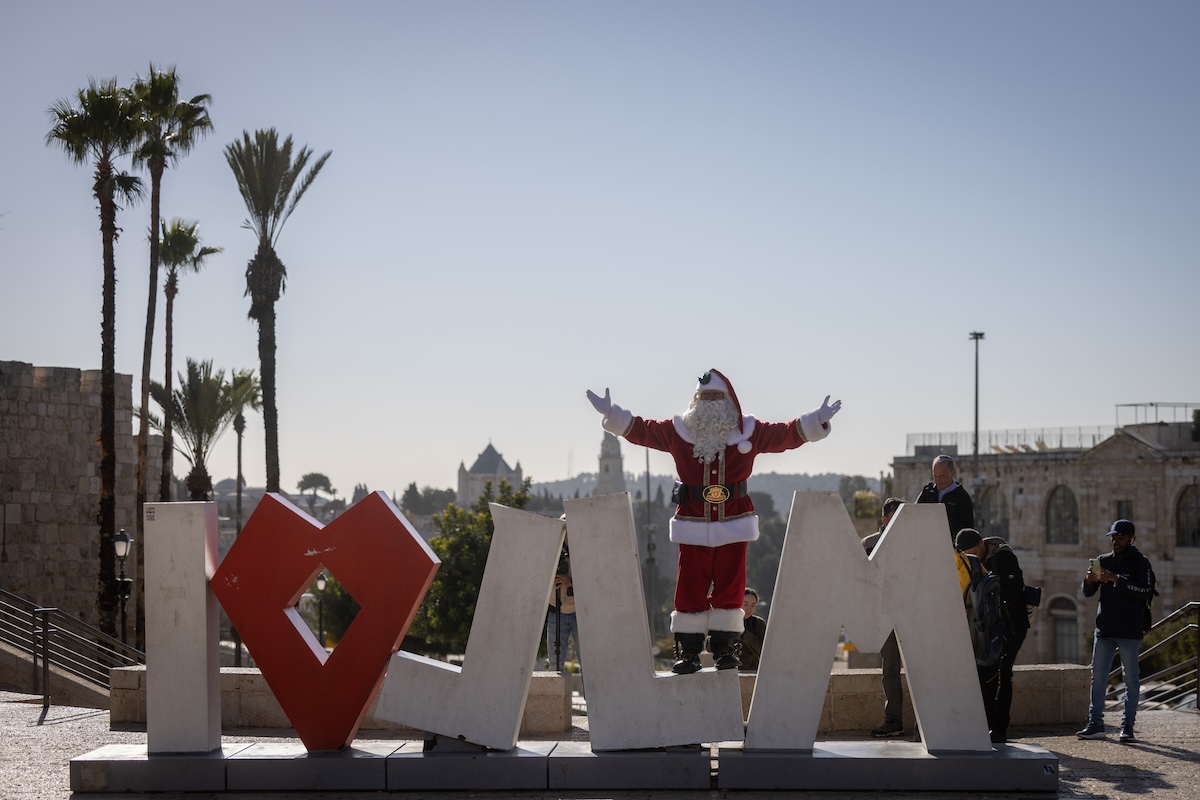
An Israeli woman named Neta, who grew up in an ultra-Orthodox family, explained her own reasons for visiting Nazareth at Christmas time, saying,
“It’s really nice to see how people from other religions celebrate their holidays. But the real reason I wanted to do this was for my nieces – they need to open their minds a bit.”

Jo Elizabeth has a great interest in politics and cultural developments, studying Social Policy for her first degree and gaining a Masters in Jewish Philosophy from Haifa University, but she loves to write about the Bible and its primary subject, the God of Israel. As a writer, Jo spends her time between the UK and Jerusalem, Israel.
You might also like to read this:






